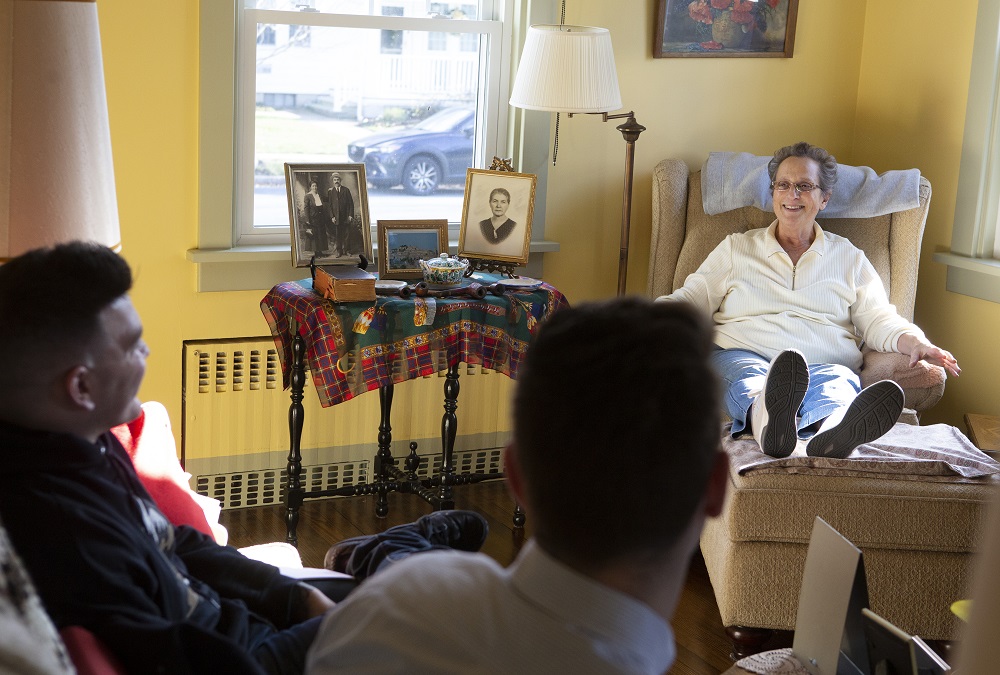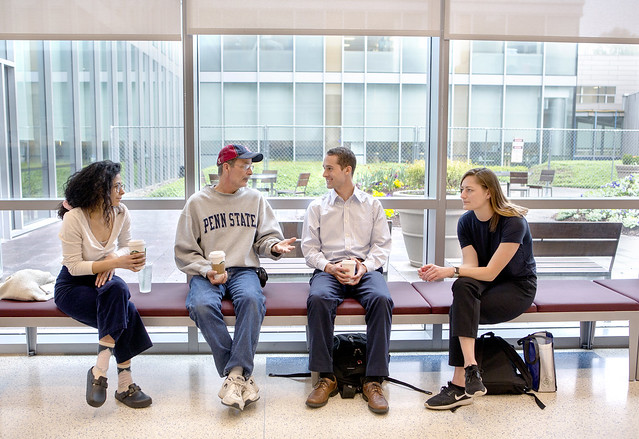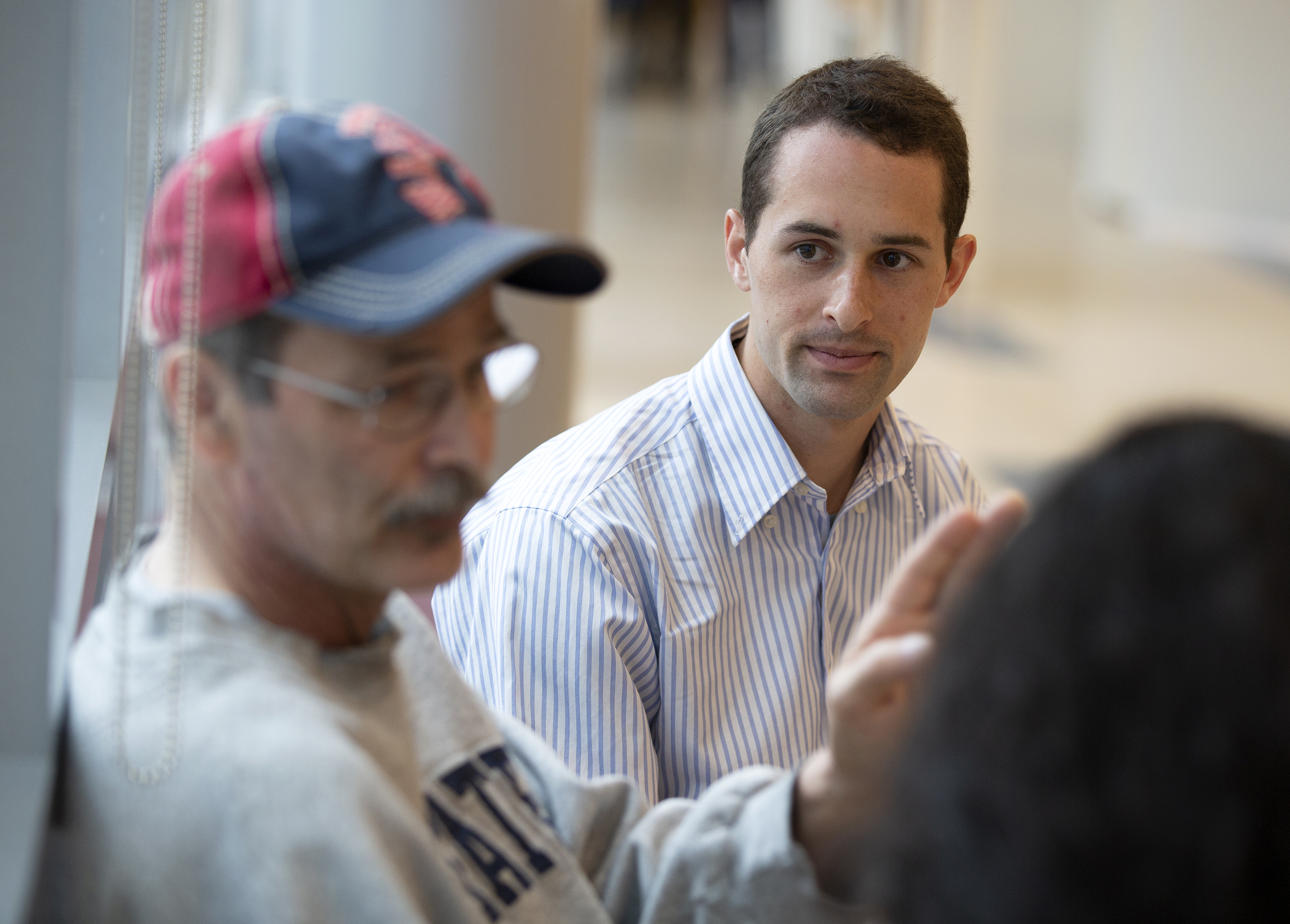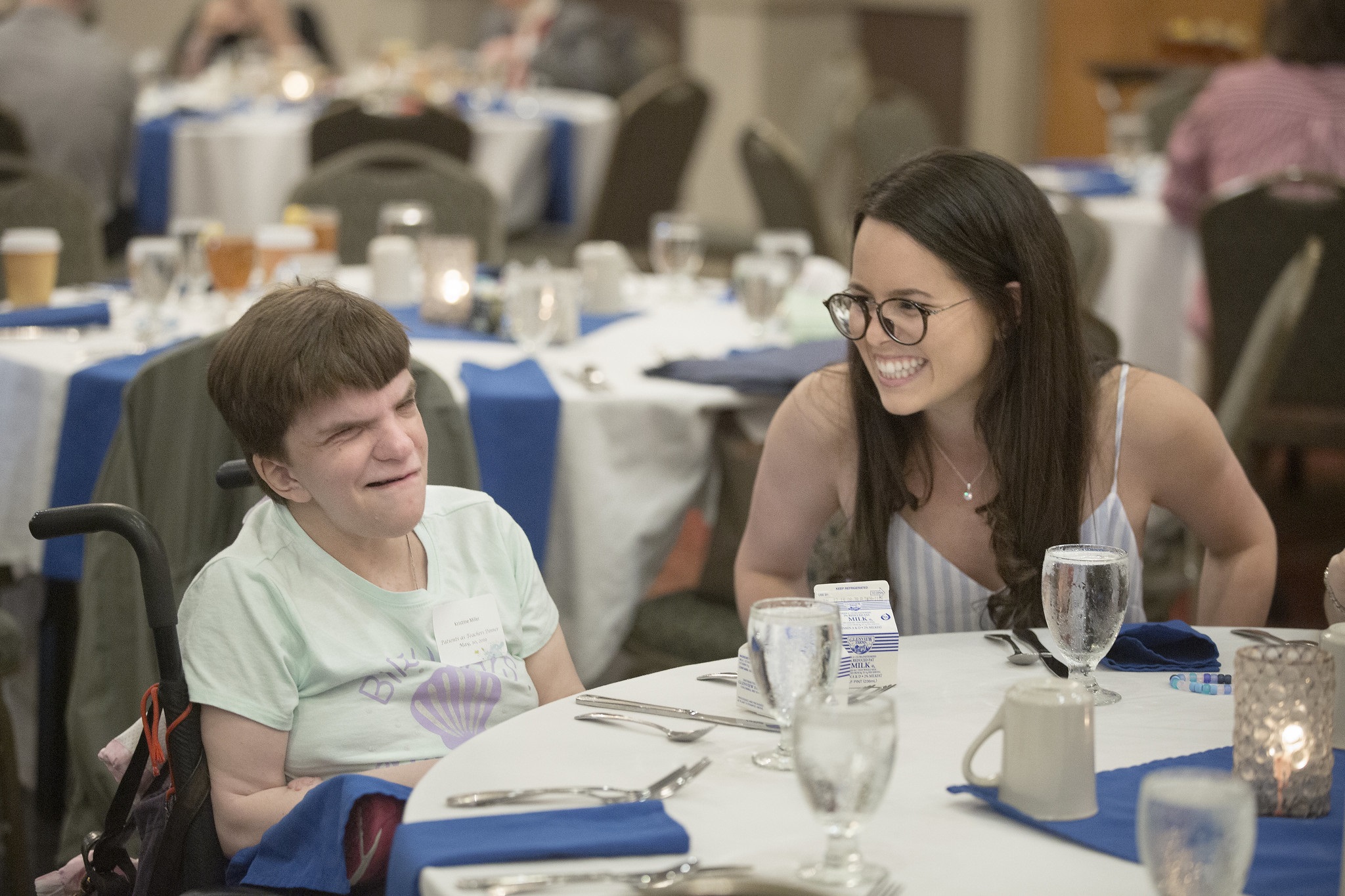When the patient is the teacher, the lesson is compassion

By Carolyn Kimmel
Matthew Chapman was nervous – even scared – when he thought about meeting his first patient face-to-face.
The first-year Penn State College of Medicine student soon found out he had nothing to fear.
“After going for the first time with my partner, I loved it,” said Chapman, who is part of the College of Medicine’s Patients as Teachers Project that pairs first-year students with established patients for one-on-one mentoring. “I think this will help give another perspective on what our patients have to deal with, besides just following medical advice.”
 Chapman and fellow first-year student Yuriy Pechenyy have been paired all school year with Maria English, a Hershey resident who has lasting effects from battling non-Hodgkin lymphoma.
Chapman and fellow first-year student Yuriy Pechenyy have been paired all school year with Maria English, a Hershey resident who has lasting effects from battling non-Hodgkin lymphoma.
“We meet at her home, where we talk about her life experiences and how her disease altered her life, as well as how her outlook on life has been altered,” said Pechenyy. “It’s rare that first-year medical students are able to have this kind of contact with patients.”
English, who has partnered with medical students since the program began more than 10 years ago, views her greatest lesson as fostering aspiring doctors’ communication connection.
“One-on-one is much better than sticking your nose in a book,” she said. “I tell all the medical students, ‘Listen to your patients because your patients know their body better than you do. And don’t ever think you’re God. There are things you’ll get wrong, but hopefully you’ll do a lot right.”
English doesn’t hold back on the gritty details of almost losing her life to cancer and what it’s like to live with it for years. “I tell them everything – probably more than they want to know,” she said with a chuckle.
Understanding Global Effect of Illness
For Chapman, it’s a lesson well learned. “I’m better able to understand the impact an illness has on someone’s life, more than just what we see at the hospital,” he said.
“Long ago, when doctors made house calls, they were much more aware of the global picture of a patient’s home and family,” said Dr. Martha Levine, associate professor of pediatrics, psychiatry and humanities at the College of Medicine and director of the Patients as Teachers Project. “We’re trying to draw on those roots and bring some of that back.”
The program was started as part of a first-year medical humanities course to help students think about loss, death and dying and disabilities. Students meet with their patients throughout the year and design videos or other creative projects to capture their relationship. The culmination of the program is a student-led dinner, where the genuine relationships and goodwill among the pairs is clearly evident.
“I don’t know of another medical school that offers this type of year-long relationship,” Levine said. “Many times, the students stay connected with their patient throughout medical school, and many patients stay in the program for years. They really enjoy working with our students and knowing that they are making a difference in their training.”

Timothy Groh, a first-year medical student, listens as Yancy Nauman talks about his health before having a chemotherapy treatment at Penn State Cancer Institute.
Humanizing Health Care
Yancy Nauman, who is paired with Tim Groh and Nicole Legro, has brain cancer. The Bainbridge resident underwent two surgeries, radiation and continues with chemotherapy, having already outlived his prognosis, he said. He suffers from intermittent headaches, peripheral vision loss and memory loss, but he says a positive attitude to “push forward” is crucial.
“I feel as if I have spent most of my time at our visits smiling and laughing while learning from him,” Groh said. “Yancy is incredibly kind, has an unmatched sense of humor and really cares about making a difference in the lives of those around him. Meeting Yancy through this program has given me a model of what it means to really get to know a patient well, and I imagine I’ll be using the Yancy standard for getting to know my future patients.”
“I tell my students I’m here for them as much as they want to see me or call me,” Nauman, 60, said. “The biggest thing I want to teach them is, to be a good doctor, you need to treat your patients like they are your father, your mother or your grandparents.”
Improving Doctor-Patient Relationships
“This program feels a little unequal because I feel like Tim and I get so much out of it compared to what we can give our patient,” Legro said.
In addition to helping her learn important relational skills, she thinks her experience will help safeguard against physician burnout.
“I think I will remember what I learned and saw throughout this program when I am feeling jaded or stressed,” she said. “This program has allowed us to walk in a patient’s shoes…It will remind me that a patient isn’t solely a person who appears in the medical office for 25 minutes, but someone who has a home, a family and beloved hobbies.”
“Patients as Teachers is a crucial part of our education,” Groh said. “It shows that our community collectively cares about training the best doctors and making health care responsive to the people we serve.”

Medical student Daniela Medina, right, talks with her patient teacher, Kristine Miller, at the annual Patients as Teachers recognition dinner in May 2019.
Patients interested in participating in the program can contact:
Tamika Washington, Office of Medical Education
Penn State College of Medicine
717-531-0003, x289262
twashington4@pennstatehealth.psu.edu
If you're having trouble accessing this content, or would like it in another format, please email Penn State Health Marketing & Communications.
